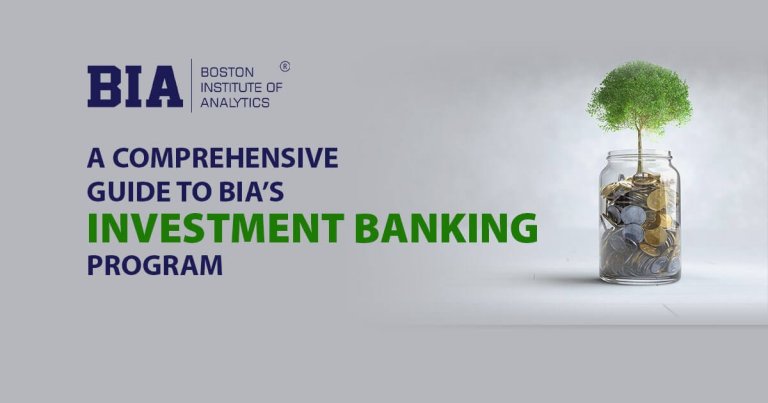HSBC Restructures Investment Banking with Focus on Private Markets: What It Means for the Future of Finance
HSBC, the fifth-largest banking group globally, has announced a major overhaul of its investment bank. The strategic shift is into private markets and debt finance, a new era in HSBC’s strategy to meet customers’ needs and construct its franchise. As the financial markets continue to change at a frenetic rate around the world, such actions mirror broader trends within the industry that are reshaping how investment banks compete and provide value.
For career professionals and seekers, awareness of these changes is necessary. Growth of private markets is opening up new opportunities with new demands, and therefore, courses such as an investment banking course gain importance. Such courses provide insight into new forces in markets and prepare learners for the changing world confidently.
In this blog, we shall discuss what HSBC’s restructuring is all about, why it is important, and how it will influence the future of investment banking careers and education.

Background: HSBC’s Legacy in Investment Banking
HSBC traditionally had a solid investment banking franchise globally with vast coverage in the Americas, Europe, and Asia. Its core investment banking activities traditionally comprised mergers and acquisitions advisory, underwriting of capital markets, and trading. Over years, HSBC gained the trust of multinational firms, governments, and financial institutions by delivering end-to-end financial solutions.
But the world of investment banking has been changing. Rising regulatory pressures in the post-2008 crisis, increased competition from boutiques, and shifting client needs have compelled banks to rethink their strategies. HSBC’s move to downsize is an acknowledgement of such pressures and a realignment towards opportunities that hold greater growth and profitability potential.
This context provides the context for why private markets in the modern world take up such a prominent place in HSBC’s vision.
What Is the Restructuring About?
At the heart of HSBC’s restructuring is a strategic decision to focus more strongly on private markets and debt finance. Private markets include a wide range of investment types, including private equity, private debt, infrastructure investment, and real assets like real estate. Compared to typical public markets, private markets typically comprise direct investment in companies or projects that are not traded on public exchanges.
Why the emphasis? Private markets have expanded consistently over the last 10 years, driven by institutional investors in search of greater returns and diversification from unstable public markets. Private market assets under management stood at more than $10 trillion worldwide, per McKinsey’s Global Private Markets Review 2024, and are continuing to increase as investors look for alternatives to invest.
Debt financing, such as credit facilities and loans issued to business firms, makes private market investment easier by using specially designed funding structures. HSBC’s move into these segments enables it to use increased investor demand as well as its international reach, particularly in rapidly growing nations such as the Middle East and Asia.
Why the Shift? Uncovering the Strategic Impetus
Several strategic imperatives are pushing HSBC into private markets. Firstly, regulatory environments have become sharper, so the expertise and cost of such traditional investment banking business as underwriting and trading are costlier. This has squeezed banks’ profitability, and so they are seeking new sources of revenue.
Private markets provide a more stable source of revenue, typically in the form of management fees and performance-based incentive fees, which are less at the mercy of the vagaries of short-term market sentiment. Further, HSBC’s extensive presence in Asia and the Middle East makes it well placed to benefit from the growing demand for private capital in these high-growth economies, which continue to record strong economic performance.
Technology assists as well. The application of financial analytics and data-driven decision-making is transforming how banks evaluate risks and reveal opportunities in private markets. These solutions assist banks in delivering more personalized and effective services, which can build closer client relationships and a competitive edge.
To better understand the significance of HSBC’s shift, take a look at how private markets are projected to overtake public markets in revenue share for investment banks globally:

Source: McKinsey Global Private Markets Review 2024
For professionals, these trends highlight the learning of knowledge in the new investment banking areas. An investment banking program with financial technology and private markets modules can be a goldmine for learning valuable skills.
Impact on Investors and Clients
HSBC’s reorganization will deliver genuine value to its customers and investors. Institutional investors, including pension funds and insurance companies, will benefit from having better access to a wider range of private market investment products that can yield appealing risk-adjusted returns and diversification opportunities.
For corporate clients, HSBC’s larger debt financing capacity translates into more creative and adaptable funding options that can drive growth, acquisitions, and infrastructure development. High-net-worth investors will also have access to opportunities in select private markets funds tailored to their investment focus.
Additionally, its application of sophisticated financial analytics improves the risk management of HSBC because it enables the company to assess investment opportunities better and track portfolio performance in real-time. This analytical advantage is important, especially in private markets since illiquidity and information asymmetry tend to elevate risk.
A recent report by Bain & Company highlights that private equity funds that use data analytics have been performing better than those that use conventional methods. This suggests a growing demand for analytical skills in combination with conventional banking skills.
Implications for Professional and Career Opportunities
HSBC’s foray into private markets is not only changing its business model but also turning the professional life of investment bankers on its head. The transition is an indication of the increasing need for professionals who have an in-depth understanding of the intricacies of private equity, private debt, and alternative investments. Conventional investment banking skills like deal structuring and financial modeling are still relevant, but now accompanied by in-depth private market understanding and analytical capabilities with a data-driven bent.
For future financiers and bankers, what this entails is that it has to be an ongoing process of staying in touch through upskilling. An investment banking program on private market basics, portfolio management, and future financial technologies can be the next step in these professions. These programs are said to incorporate technical and real-time case studies, equipping the students to step into the high-end investment arena that banks such as HSBC want to cover.
In addition, there is also growing reliance on financial analytics expertise. Learning how data analytics software is used in investment return and risk measurement, portfolio matching, and market trend forecasting makes one increasingly desirable in today’s dynamic world.
With HSBC’s restructuring conforming with industry-wide trends, experts in this kind of education are best positioned to take advantage of upcoming opportunities in private wealth management, alternative asset management, and debt advisory services.
The Role of Financial Analytics in Modern Investment Banking
Financial analysis is the root of contemporary investment banking, especially in private markets. As the banks move towards the clouds and the complexities of investment, analysis-driven analysis assists in the management of risk and the revelation of hidden value that may not be possible through conventional means.
Financial assessment in HSBC restructuring facilitates better investment decisions by monitoring market environments, borrowers’ creditworthiness, and assets’ performance in real time. Advanced methods like predictive analytics and machine learning can detect likely events to enable enhanced risk pricing and optimal portfolios.
A 2023 report by Deloitte mentioned that companies investing in artificial intelligence and solutions based on analytics are reporting success rates for private equity deals as high as 15 to 20 percent more. This indicates the critical importance of financial analytics in staying competitive.
For investment banking professionals, in the future, learning financial analytics skills is no longer a matter of option. Most of the current investment banking courses include modules of financial analytics, which combine classic valuation techniques and data science tools. With this combination, professionals are ready to survive and flourish in the technology era, overlapping with finance.
Boston Institute of Analytics: Preparing You for the Future of Investment Banking
For those interested in making a career in such newer trends, Boston Institute of Analytics is especially well-provided with its special courses for meeting the requirements of the new finance environment. The course in investment banking is specifically created to provide students with the basics and newest methods in private markets, financial models, and data-driven decision-making.
BIA curriculum is more focused on practical application, combining theory and actual projects that reflect the challenges of today’s practitioners. The program also includes improved financial analytics methods in the effort to equip students with the ability to be able to utilize technology to improve investment practices.
With industry professionals as faculty and good corporate associations, Boston Institute of Analytics trains students to understand the current market trends as well as future trends. All this balanced endeavor empowers alumni to navigate the choppy demands of investment banking experts, owing to strategic changes like those of HSBC, with ease.
For both students and finance professionals, taking a course like this is an investment in their careers that enables them to move with the variability of the industry and gain entry into private market opportunities and beyond.
Conclusion: A New Era for Investment Banking
HSBC’s reorganization is a milestone in the development of global investment banking history. Through its private market focus and reliance on financial analysis, the bank is not just reacting to an altered economic and regulatory landscape but is also setting forth the model for how large financial institutions can remain agile and competitive.
This strategic reorientation portends a broader industry reorientation, one in which long-term, stable expansion is more valued than short-term bottom line and product and process creativity are fostered. To investors, customers, and professionals, the message is evident: to thrive in finance today, one must have established experience in private markets, mastery of data, and active monitoring of new capabilities.
As career paths shift away from old-school investment banking silos into more nimble, tech-driven roles, it’s time to prepare. A high-tech investment banking course online can deliver not only a competitive edge but a career foundation for success in this new global world of finance.
No matter whether you are a career analyst, a mid-level professional or an M.B.A. hopeful, this is your time to stake your claim on the future of the business. The way investment banking is constructed tomorrow is through what’s done today, and those who are prepared will lead the way.
Investment Banking Course in Mumbai | Investment Banking Course in Bengaluru | Investment Banking Course in Hyderabad | Investment Banking Course in Delhi | Investment Banking Course in Pune | Investment Banking Course in Kolkata | Investment Banking Course in Thane | Investment Banking Course in Chennai







